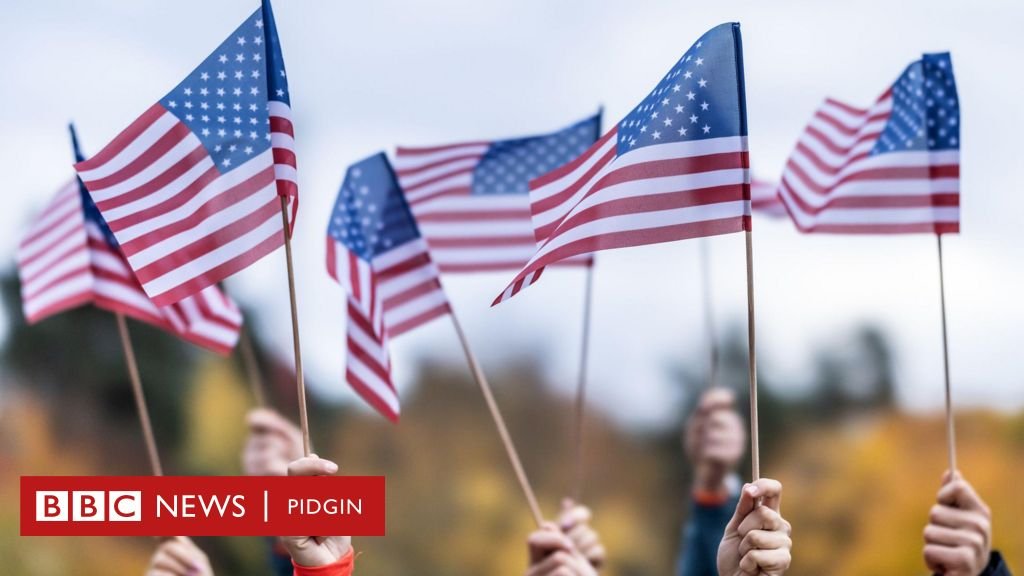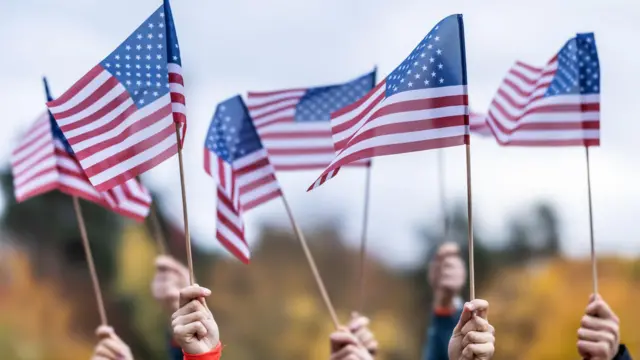
Wia dis foto come from, Getty Images
Last week, 59 white South Africans land Dulles airport near Washington DC, afta dem give dem refugee status.
President Trump tok say di Afrikaners, one minority group wey descend from European colonists, be victims of “racial discrimination” and “genocide”.
South African President Cyril Ramaphosa tok say di allegations no be true and evidence no dey to support dem.
Wit di casual dress dem wear and waving di American flags, US authorities welcome di group of men, women and children.
Critics tok say wetin happun no dey in line wit Oga Trump administration current position on refugees.
For January, President Trump bin issue one executive order wey suspend di refugee settlement program. Dis order stop refugee admissions, and e leave more dan 100,000 pipo stranded.
However, di order allow for small exceptions wey go dey determined on a case by case basis. Di following month President Trump sign anoda executive order wey grant Afrikaners refugee status.
Di decision bin lead to widespread criticism and anger across South Africa, wia Afrikaners, wey make up just 7% of di kontri population get half of di farmlands for di kontri. President Rampahosa bin describe di group moving to di US as “cowards.”
“If you look all di national groups for our kontri, black and white, dem stay for dis kontri becos na our kontri and we no suppose run away from our problems. We gatz stay here and solve our problems,” e tok.
Human rights groups, commentators plus even di Episcopalian Church don condemn di move, wey dem say no go help resettle Afrikaners sake of dia commitment to “racial justice and reconciliation”, wey effectively end dia near forty-year partnership wit di US goment.
BBC bin ask di Deputy Secretary of State, John Landau, why dem give white South Africans refugee status ova pipo wey dey run sake of persecution, like Afghans.
E say entry criteria bin take into consideration how easily refugees fit assimilate.
Di mata spark debate about di role of politics and strategic interests in deciding who dem dey allocate refugee status to.
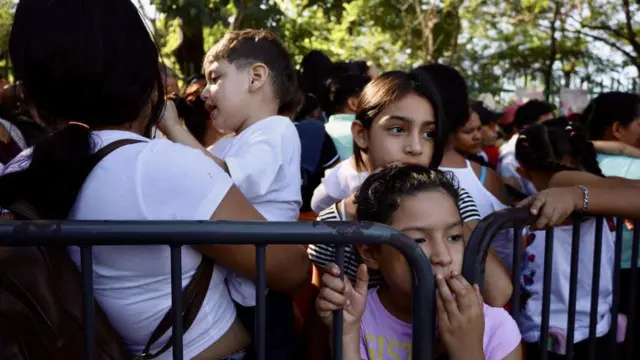
Wia dis foto come from, Getty Images
Wetin be refugee?
Di 1951 Refugee Convention bin define refugee as pesin wey get “serious fear say go victimise am sake of im race, religion, nationality, membership of one particular social group or political opinion and e dey outside di kontri of [dia] nationality and e no fit, or sake of dat fear, no wan avail [imsef] of di protection of dat kontri; or pesin wey no fit return to dia own kontri sake of fear.
Dem limit di original definition to European refugees afta World War II, but dem amen di Convention for 1967, wey remove geographical restrictions.
Di convention bin also outline refugee rights.
Refugees in numbers
According to di UNHCR, as of June 2024, na about 43.7 million refugees dey around di world. 65% of all refugees under di agency mandate come from just four kontris: Syria, Venezuela, Ukraine and Afghanistan.
Majority of di refugees, 71%, come from low to middle income kontris. Iran, Turkey, Colombia, Germany and Uganda dey di top five host nations. Neighbouring kontris dey host close to 70% of refugees.
Under President Joe Biden, di number of refugee wey apply to di United States dey capped at 125,000 a year.
For di last year of im presidency, dem grant more dan 100,000 pipo refugee status, di highest in 30 years.
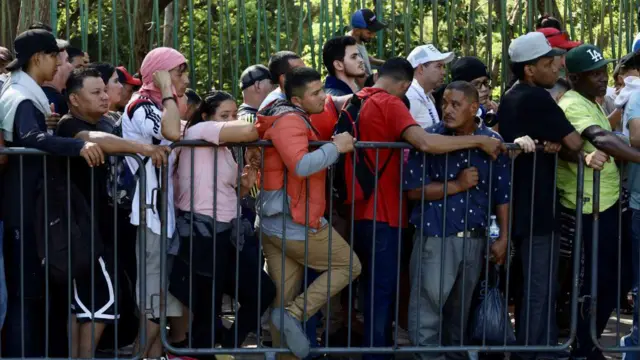
Wia dis foto come from, Getty Images
Wetin be di difference between refugee, asylum seeker plus migrant?
Refugee na pesin wey run comot from im kontri sake of war, violence or persecution. Di pesin dey entitled to legal protection wen dem grant am refugee status.
Asylum seeker na pesin wey comot dia kontri sake of violence, war or persecution, but dem neva legally recognised am as refugee.
According to di IOM, no solid definition dey of a “migrant” but one generally accepted description na “pesin wey move from im or her place of usual residence, weda within a kontri or across international border, temporarily or permanently, and for different reasons”.
Which factors dey influence who dem dey grant refugee status?
Dem dey recognise Refugees based on definitions wey international law set, but individual kontris get di process dem take dey determine who dey qualified.
Tendai Achiume, professor of law for Stanford and one former United Nations Special Rapporteur on Racism and Racist Discrimination, say biases dey exist wen e come to who dem dey give refugee status.
She say some kontris prefer to assist pipo dem share connection wit, and white refugees dey get degree of “privilege and protection” wey non-white refugees no dey get.
“Ukraine na very real and vivid example of dis,” she tok.
“Pipo all ova di world shout wen we see fotos of pipo wey dey run comot di kontri, di treatment dem give pipo wey no be white wey run comot Ukraine no be di same.”
Achiume tok say a kontri strategic interests dey also shape di way kontris choose to admit refugees. For instance, e fit be say one kontri express particular interest for di way dem wan respond to di displacement dem cause.
“Sometimes kontris go express preferences for more vulnerable refugees, like women, children or elderly pipo wey dey experience particular forms of persecution,” Achiume tok.
“But international law ban discriminatory preferences in di direction of discrimination, for instance on di basis of race, religion, national origin.”
How refugee communities for di US respond to recent events?
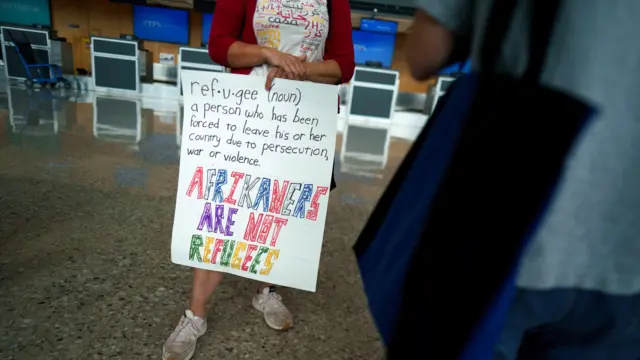
Wia dis foto come from, Getty Images
Refugee communities across US dey fearful about di sudden policy changes, Nils Kinuani, di Federal Policy Manager of African Communities Together, one organisation wey dey support African immigrants for di US, tok.
“Pipo no just know wetin to expect and how to plan dia lives,” e tok.
E say di way dem grant Afrikaners refugee status so quickly, while thousands of odas don spend years going through di process, bin send out a “disturbing message”.
“Dem build America on top foundation wey show say na welcoming kontri wey dey provide protection to pipo in danger. Now we see how dis administration dey give dis benefits to pipo wey dey privileged,” e tok.
Kinuani tok say di decision by di Trump administration dey motivated by “racism”.
Wen dem ask Oga Trump why dem process di Afrikaners refugee applications sharp-sharp pass oda groups, di President tok say di race no be factor
“Dem kill farmers, dem happun to be white, but weda dem be white or black, e no make any difference to me.
Kinuani add say Trump decision dey in line wit current domestic policy wey don see attempts to redress racism for di US, like affirmative action, rolled back.
Tendai Achiume agree.
“Di Trump administration bin cite land reform programs, affirmative action measures as di basis for singling out Afrikaners,” she tok.
